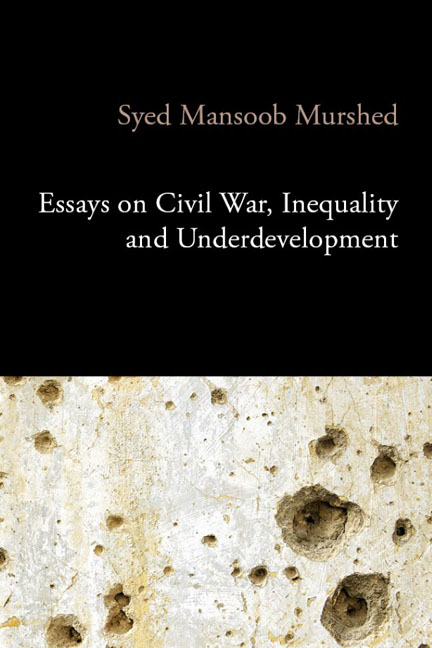Book contents
- Frontmatter
- Contents
- Preface
- Tables and figures
- 1 Conflict, civil war and underdevelopment
- 2 Revisiting the greed and grievance explanations for violent conflict
- 3 Greed, grievance and globalization
- 4 Economic dimensions of the liberal peace and its implications for conflict in developing countries
- 5 Enforcing peace agreements through commitment technologies
- 6 The conflict–growth nexus and the poverty of nations
- 7 Conflict and fiscal capacity
- 8 Does civil war hamper financial development?
- 9 The clash of civilizations and the interaction between fear and hatred
- 10 Transnational terrorism as a spillover of domestic disputes in other countries
- 11 Quantitative restrictions on the flow of narcotics: supply and demand restraints in a North–South macro-model
- 12 Spatial-horizontal inequality and the Maoist conflict in Nepal
- 13 Socioeconomic determinants of everyday violence in Indonesia: an empirical investigation of Javanese districts, 1994–2003
- 14 Not loving thy neighbour as thyself: trade, democracy and military expenditure explanations underlying India–Pakistan rivalry
- Acknowledgements
- References
- Index
11 - Quantitative restrictions on the flow of narcotics: supply and demand restraints in a North–South macro-model
Published online by Cambridge University Press: 09 January 2024
- Frontmatter
- Contents
- Preface
- Tables and figures
- 1 Conflict, civil war and underdevelopment
- 2 Revisiting the greed and grievance explanations for violent conflict
- 3 Greed, grievance and globalization
- 4 Economic dimensions of the liberal peace and its implications for conflict in developing countries
- 5 Enforcing peace agreements through commitment technologies
- 6 The conflict–growth nexus and the poverty of nations
- 7 Conflict and fiscal capacity
- 8 Does civil war hamper financial development?
- 9 The clash of civilizations and the interaction between fear and hatred
- 10 Transnational terrorism as a spillover of domestic disputes in other countries
- 11 Quantitative restrictions on the flow of narcotics: supply and demand restraints in a North–South macro-model
- 12 Spatial-horizontal inequality and the Maoist conflict in Nepal
- 13 Socioeconomic determinants of everyday violence in Indonesia: an empirical investigation of Javanese districts, 1994–2003
- 14 Not loving thy neighbour as thyself: trade, democracy and military expenditure explanations underlying India–Pakistan rivalry
- Acknowledgements
- References
- Index
Summary
Introduction
The increase in transnational crime, particularly associated with the increased drug trade, is widely recognized as part of the negative side of increased globalization. According to the UNDCP (1998) estimates, the global production of opium by volume increased by 141 per cent between 1986‒96. In the same period there was a 24 per cent rise in coca leaf output. There are several stages of processing before the final product sells in the developed North. More important, is the huge value added from the primary commodity to the final product. To give one example, the price of coca leaf was US$1 per kilogram in Colombia in 1998, but the base for cocaine was US$800. This implies an 800-fold rise in value, even before final production and shipment. Farmgate prices of opium and coca have risen, while the street value of heroin and cocaine in Europe and the USA are declining. It is clear from the volume sold that there has been a sharp rise in the demand for heroin and cocaine in the North.
Civil wars and organized crime both produce violence. The problems associated with drug production are similar to the causes of conflict, and involve the interaction of greed and grievance (Murshed 2002a, Chapter 1 in this volume; Collier & Hoeffler 2004). Poverty produces grievance which can lead to drug production, which results in violence and even more grievance. Armed political groups use drug revenues to finance their wars; alternatively simply to satisfy their greed when the political-economic reasons for war have been assuaged (Northern Ireland). Thus, grievance can easily descend into banditry. Similarly, drug-barons, whose motives are purely mercenary, use armed force to further their political and economic ambitions.
Poverty is as central to the economics of violence as greed. It produces incentives for violent acts, and lowers the costs of fighting. Most drug producing states are low-income developing countries belonging to the South. Many of the causes of poverty are domestic in nature and are associated with bad policy choices as well as historically inherited inequities in asset ownership. But there are external factors as well.
- Type
- Chapter
- Information
- Essays on Civil War, Inequality and Underdevelopment , pp. 183 - 196Publisher: Agenda PublishingPrint publication year: 2021



